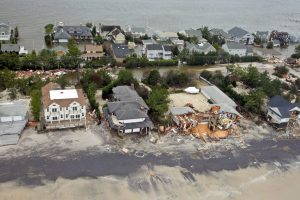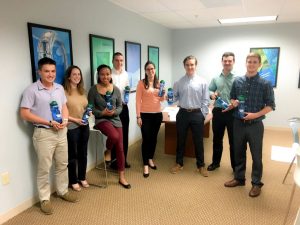The United States is currently in the midst of hurricane season, which runs from June 1 – November 30. With the threat of hurricanes, such as Hurricane Matthew, come concerns over flooding, property damage, and power outages. In addition, falling trees and debris, broken but live electrical wires, and areas of flooding pose a major threat to human safety. However, there is another significant but often overlooked threat to human health that frequently occurs during hurricanes: water quality degradation.

Hurricanes typically bring with them massive amounts of precipitation – far more than the earth can handle. These surges create giant runoff situations, where pollution, contaminants, trash, and chemicals from the ground are pushed into the local water supply. To make matters worse, water treatment plants are often not able to handle the sudden, significant increase in contaminants, and also may not be working at full capacity due to power outages. This flooding also affects water mains and household lines, sometimes causing the water to bypass water treatment altogether.
But that’s not all. The pounding rain and storm surges brought by hurricanes can also overwhelm sewer systems, causing sewage overflows. The massive flooding of Hurricane Sandy in 2012 overwhelmed the region’s wastewater treatment plants, causing 11 billion gallons of largely untreated sewage to flow into waterways and city streets, mostly in New York City and New Jersey. In addition, the pounding surge caused significant damage to treatment plants, further complicating the issue, and contaminating water supplies.
Lastly, overwhelming amounts of rain and surge as seen with hurricanes can cause excessive amounts of dissolved organic matter (DOM) — soluble organic materials composed of the remains of organisms such as plants and animals and their waste products — to enter waterways. DOM causes a plethora of problems in drinking water: it easily binds with metal pollutants and carries them to reservoirs and lakes, it blocks pathogen-reducing ultraviolet rays, and it also enhances the formation of disinfection byproducts, which are carcinogenic.

Hurricanes clearly have the ability to not only damage personal property and threaten human safety, but also wreak havoc on our nation’s water supply. The combination of increased contamination, decreased treatment, overflowing sewer systems, and excessive DOM in the water has the potential to cause serious water quality issues. Therefore, during hurricane events, it is always smart to be prepared. Prior to the storm, stock up on bottled water. While municipal water should always be the drink of choice in normal day-to-day living since bottled water has its own set of problems, the safe choice when water quality issues arise as a result of a hurricane is bottled water. After the storm, check on the status of your area’s water quality. Until the authorities give your local municipal water the all clear, stick to bottled water for drinking.
For up-to-the-minute updates on Hurricane Matthew, please visit www.weather.com. And stay safe!
